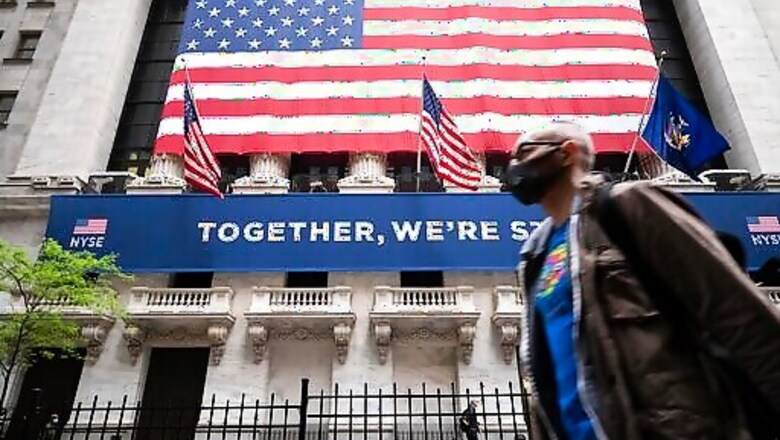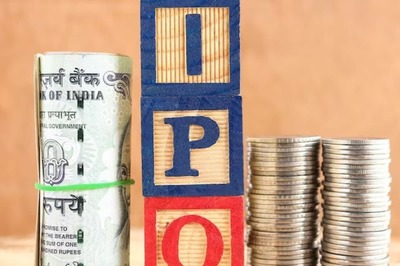
views
NEW YORK: Stocks are drifting close to their record heights in early trading on Wall Street Tuesday after the United States and China indicated some progress in trade talks, helping to calm one of the markets bigger worries.
The S&P 500 was up 0.1% after the first 15 minutes of trading, with slightly more stocks rising in the index than falling. The Dow Jones Industrial Average was down 32 points, or 0.1%, at 28,275, as of 9:45 a.m. Eastern time, and the Nasdaq composite was virtually flat. Treasury yields rose.
Earlier, the worlds two largest economies said they held constructive talks as they negotiate how to implement their Phase 1 deal, which set a truce in their trade war.
Tensions between the United States and China have been ramping up recently, with President Donald Trump targeting Chinese technology companies in particular. The worsening relationship has been one of the bigger concerns for investors, particularly given how destructive the escalating tariffs of the U.S.-China trade war were for the global economy earlier.
The U.S. Trade Representatives office said that both sides see progress following the talks. Chinas Ministry of Commerce said the two sides discussed strengthening coordination of their economic policies, though it gave no details.
The U.S.-China trade tensions are just one of the many on a long list of worries dogging the market, headlined by the coronavirus pandemic and the devastating worldwide recession it caused.
Other concerns include whether Congress can get past its partisan disagreements to agree on sending more aid to the economy, which investors say is desperately needed, and whether stock prices have become too expensive relative to how much profit companies are producing.
But none of those concerns has been loud enough to keep the S&P 500 from plowing to new record heights by the day. The benchmark index returned to an all-time high last week after erasing the last of its losses from the pandemic. If it rises again Tuesday, it will be the fourth straight gain for the index.
Much of the stock market’s heavy lifting came from a handful of Big Tech companies, which have been screaming higher as the stay-at-home economy has accelerated work-from-home and other trends that help them.
Underlying it all is massive support for markets and the economy from the Federal Reserve. The central bank has slashed short-term rates to nearly zero and is buying all kinds of bonds, which helps drive some investors into the stock market and push up its prices.
The Feds chair, Jerome Powell, will give a highly anticipated speech later this week, where investors expect to hear him talk about next steps for monetary policy.
The yield on the 10-year Treasury rose to 0.69% from 0.64% late Monday.
Shares of Exxon Mobil, Pfizer and Raytheon Technologies all slipped in their first trading after an announcement that theyll drop out of the Dow Jones Industrial Average before trading opens Monday. Exxon has been the longest-running member of the blue-chip stock measure, and it was first added in 1928 when it was still named Standard Oil of New Jersey.
Exxon Mobil dipped 0.7%, Pfizer fell 0.8% and Raytheon lost 1.6%.
Salesforce.com, Amgen and Honeywell International will replace the trio. All three rose at least 2%.
S&P Dow Jones Indices said its making the moves because Apple is about to split its stock, which will result in a lower share price. Because the Dows movements are based on how much a companys share price is not how much the company is worth in total, like other indexes the stock split would have reduced the technology industrys weight in the Dow.
In European stock markets, the French CAC 40 rallied 0.9%. The German DAX returned 0.5%, and the FTSE 100 in London slipped 0.3%.
Asian markets were mixed. Japans Nikkei 225 rose 1.4%, and South Koreas Kospi jumped 1.6%. The Hang Seng in Hong Kong lost 0.3%, while stocks in Shanghai slipped 0.4%.
Benchmark U.S. crude oil rose 1.7% to $43.36 per barrel as Hurricane Laura barrels toward the U.S. Gulf coast, home to much of the country’s energy production. Brent crude, the international standard, gained 1.7% to $45.89 per barrel.
Wholesale gasoline rose 2.5% on worries that the hurricane could damage refineries and cut off supplies.
___
AP Business Writers Yuri Kageyama and Joe McDonald contributed.
Disclaimer: This post has been auto-published from an agency feed without any modifications to the text and has not been reviewed by an editor



















Comments
0 comment